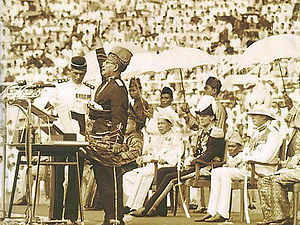

Merdeka (Jawi: مرديک; Indonesian: [mərˈdɛka], Malay: [mərdeka]) is a term in Indonesian and Malay which means "independent" or "free". It is derived from the Sanskrit maharddhika (महर्द्धिक) meaning "rich, prosperous, and powerful". In the Malay Archipelago, this term had acquired the meaning of a freed slave. The term is also used in other Indonesian languages.
The term Mardijker is a Dutch corruption of the Portuguese version of the original Sanskrit words and was used to designate former Portuguese and Dutch slaves from India in the East Indies, known as Mardijkers, whence the Malay meaning of "free(dom)" is derived. The Mardijkers were former Catholic slaves brought from India and the East Indies, who were liberated by the Dutch if they abandoned Catholicism and joined the Dutch Reformed Church.[1]
The term was used by the anti-colonialist and pro-independence movements in the colonial territories of the Dutch East Indies, British Malaya, and the Straits Settlements. It became a rallying call for those demanding independence from the colonial administrations of the Netherlands and United Kingdom. In the southern Philippine island of Mindanao, the Moro people belonging to major ethnolinguistic groups of Meranaw, Maguindanaw, and Iranun, use maradeka in the same meaning as freedom or liberation and a political group there is called Maradeka. The Pampangan term mardíka (also spelled mardíkas) and the Tagalog maharlika have the same Sanskrit etymology as the Malay merdeka and means freeman, libertos or freedman in classical Philippine society.[2][3]
- ^ Mardijker
- ^ Scott, William Henry (1992). Looking for the Prehispanic Filipino and Other Essays in the Philippine History. Quezon City: New Day Publishers. ISBN 971-10-0524-7.
- ^ Mallari, J. P. (2011). Tálabaldúgan. Holy Angel University